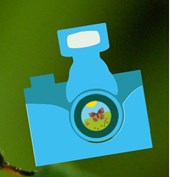Love pollinators
What are pollinators?
Pollinators are creatures that transfer pollen from one flower to another to fertilise plants so that they can make fruit and/or seeds. Without them, plants cannot reproduce.
Worldwide, thousands of bee species are pollinators for a huge variety of plants. Many other insects – flies, wasps, beetles, butterflies – are also vital for the transfer of pollen from one flower to another.
Why are pollinators important?
Every third mouthful of food we eat has been created by pollination. We need pollinators to grow the food we love - the list is huge and includes apples, pears, avocados, cabbage, mangoes, brazil nuts, cashews, , strawberries ... and chocolate!
Pollinators are good for our economy. The value of pollination to agriculture in the UK is estimated at £690 million. If we were to pollinate crops by hand it would cost £1.8 billion - making our food bills a lot higher than they are now. Worldwide the honeybee population alone is worth £30 billion.
Pollinators are good for tourism. They provide colour for our wild places, making the countryside a much nicer place to visit. This is also true for our towns and cities. Most of the colourful plants and flowers, that are the lifeblood of our parks and gardens, depend on pollinators. Without pollinators our world would be a much duller place.
Our pollinators are disappearing
- Half the UK's 27 bumblebee species are in decline
- Three of these bumblebee species are already extinct
- Seven bumblebee species have declined by more than 50% in the last 25 years
- Two-thirds of our moths and 71% of our butterflies are in long term decline
- Of the 43 species of butterfly seen in Wales, 10 are in severe decline and 17 are declining. Overall 63% of Welsh butterflies are declining
Why are our pollinators disappearing?
There are several reasons for the decline in pollinators
- Climate change and the unpredictable or extreme nature of the weather
- Pesticides - that kill ‘pests’ but also harm pollinators
- Modern agricultural practices that remove hay meadows and flower-rich habitats for a more intensive method of farming
- Changes in pollinator habitats such as fragmentation or inappropriate grazing at certain times of year can deprive pollinators of a food source when they most need it
What can you do to help?
Humans need food and shelter. Pollinators’ needs are no different. Their needs are provided by habitats such as meadows, hedgerows, woodland edges, grasslands, gardens and orchards. They need flowery habitats rich in nectar and pollen for food and suitable wild spaces for nests and hibernation.
There are many things we can do to make it easier for pollinators to survive. We can make sure that we take every opportunity to provide them with their essential needs. These can be relatively simple such as managing grass verges in a more sensitive way, or leaving wild areas around our offices, homes and public buildings.
We can all help by making our gardens pollinator-friendly by not using pesticides, not mowing the lawn as often, and growing pollinator-friendly plants.
Other ways to help pollinators
These group have lots of tips to help you identify pollinators. They also have lots of ideas on how you can make your garden or workplace a better place for wildlife.
- Butterfly Conservation
- Hoverfly Recording Scheme
- Get Britain Buzzing
- Biodiversity Wales - Ecosystems and Species Expert Groups
- Keep Wales Tidy
- Welsh Government Action plan for pollinators
- North Wales Wildlife Trust
- National Botanic Garden of Wales - plants for wildlife
- https://www.opalexplorenature.org/polli-nation
- http://www.biodiversitywales.org.uk/Wales-Action-Plan-for-Pollinators
- Royal Horticultural Society - Plants for pollinators
- https://www.buglife.org.uk/b-lines-hub
- Bees, Wasps and Ants Recording Society
Be a pollinator paparazzi
 Get involved in our social media campaign - Pollinator Paparazzi (#pollinatorpaparazzi) by sharing your photos of the A-list pollinators that visit your garden.
Get involved in our social media campaign - Pollinator Paparazzi (#pollinatorpaparazzi) by sharing your photos of the A-list pollinators that visit your garden.
